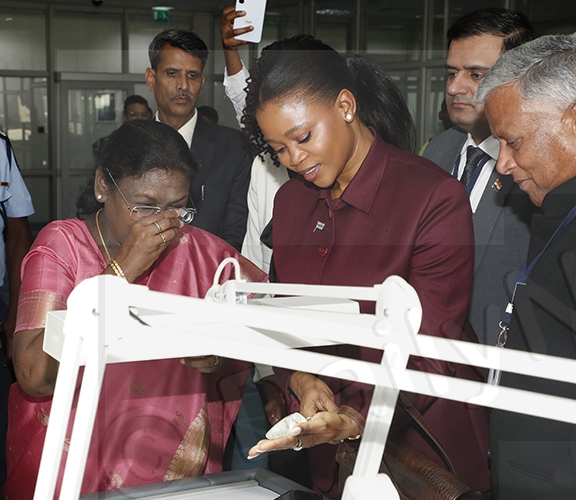Dairy goats farming abound with opportunities
29 Mar 2021
The dairy goats sub-sector is one of the untapped markets in the country, which has the potential to create employment and significantly contribute to the economy.
In an interview with BOPA recently, Ministry of Agricultural Development and Food Security’s Scientific Officer in Dairy goats sub-sector, Ms Nonofo Morewaleiso said the sub-sector was still at an infant stage in Botswana.
She highlighted that currently there was a total of 21 farmers in their department’s inventory comprising 18 individual farmers and three government institutions from different locations across the country.
She said most dairy goat farmers identified, owned between two to 20 goats mainly for subsistence purposes, adding that other farmers keep dairy goats for fostering those kept for meat production.
Ms Morewaleiso said herd population stood at 573 goats with 191 goats on milk, producing 5 775 litres of milk per annum, adding that the sub-sector had created employment for 24 people excluding government institutions.
“Under normal circumstances, each doe can produce 2 – 4 litres of milk per day, with correct care,” she added.
She explained that goat milk was sold at an average price of P15 per litre by few farmers and one farmer was engaged in milk value addition producing cheese which was sold at P35 per 100g and yoghurt at P20 per litre.
She explained that goat milk was healthier than cow milk, as it was low in cholesterol, had lesser allergens and was easily digestible.
“Goat milk has higher amounts of potassium, iron and Vitamin A than cow milk,” she explained.
The scientific officer pointed out that the sub-sector was faced with a number of challenges, citing lack of local breeders, which led to high cost of importing stock, worsened by quarantining of stock for 30 days to control cross boarder disease.
She indicated that the market was under developed, adding that there was also limited research on dairy goats in the country hence inadequate technical knowledge on dairy goats.
Regarding what the government was doing to help grow the sub-sector, she noted that dairy extension officers conducted farmer training courses in the districts to empower them on dairy management skills, adding that for practical training, farmers were attached at model farms where they acquainted with daily farm activities and routines.
Ms Morewaleiso highlighted that the ministry assisted with benchmarking trips to places of interest.
She explained that Dairy Goats Association of Botswana through the help of the ministry went on benchmarking exercise in February 2020 to various dairy goats farms in South Africa to acquire knowledge on how to efficiently and effectively run farms. The recent lifting of ban on livestock importation, she said had enabled farmers to purchase dairy goats across the border.
She pointed out that through the Integrated Support Programme for Arable Agriculture Development (ISPAAD) farmers purchased fodder seeds on subsidy to produce a maximum of five hectares of fodder crops as well as napier grass seedlings to produce a maximum of five hectares.
Ms Morewaleiso said there were opportunities in the sub-sector value chain such as demand for breeders of dairy goats, processors of milk and milk products.
She indicated that dairy goats required less space than dairy cows, easier to manage, noting that they needed less feeds, less labour, less water and low start-up capital.
She explained that goats matured fast and were good breeders with incidences of twins therefore replacement stock would always be available as well as continuous milk production.
Ms Alida Burnett, a farmer based in Ruretse also believed that the dairy goats sub-sector had the capability to contribute to the economy.
She said a lot could be achieved through the value chain such as employment creation and production of different goods.
Different products, she said such as cosmetics, soaps, cheese, yoghurt and many others could be produced from goat milk.
“Production of such products will mean creating a good number of jobs for the unemployed,” she said.
She pointed out that she produced cheese, yoghurt as well as kefir, a probiotic which boosted immune system, both in human and animals.
Ms Burnett urged all those in the sub-sector and those wishing to venture into it to equip themselves with education on dairy goats farming.
“With education our farms will run efficiently and effectively hence producing desired results,” she added.
She indicated that they had to be dedicated and willing to put in extra hours of work. She urged women to venture into the sector since they could carry out almost all duties including milking as well as producing other different products such as cheese and yoghurts.
For this sector to grow, she said a lot needed to be done, highlighting the need for a central place where farmers could take their milk for processing.
“We are in constant communication with the responsible ministry on how they could assist in growing the sector, they assist us in a number of ways such as testing if our milk is safe for human consumption as well as helping in acquiring permits to buy from outside the country,” she said.
Committee chairperson of Dairy Goats Association of Botswana, Mr Stewart Tau explained that compared to cow milk, goat’s milk was slightly lower in lactose, hence could be fed to lactose intolerant babies. Goat milk, he said was easier to digest making it perfect food for children, the elderly, those with digestive difficulties, those recuperating from a disease as well as pets that had been weaned from their mothers.
He indicated that goat’s milk benefits outweighed those of cow’s, adding that there were a lot of other benefits. Mr Tau said there were a lot of challenges in the sub-sector such as lack of artificial insemination and embryo transplant facilities for small stock. Ends
Source : BOPA
Author : Thato Modiakgotla
Location : Gaborone
Event : Interview
Date : 29 Mar 2021





